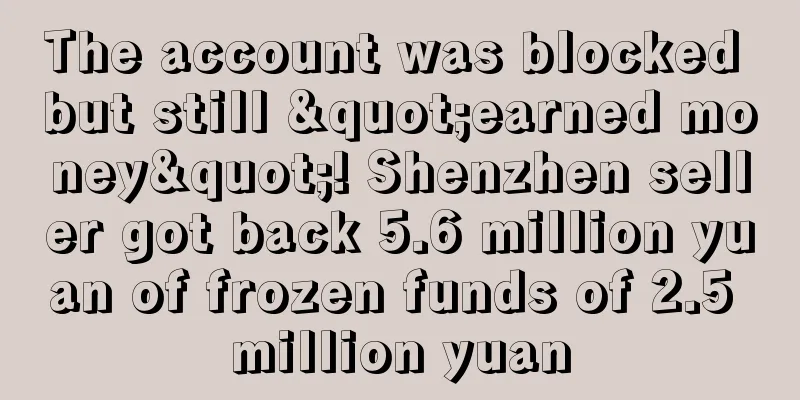The account was blocked but still "earned money"! Shenzhen seller got back 5.6 million yuan of frozen funds of 2.5 million yuan

|
Since the end of April 2021, Chinese sellers have encountered a wave of Amazon account bans. A large number of sellers' accounts have been blocked and their funds have been frozen. Some sellers' businesses have plummeted. At one time, countless cross-border people have laid off employees, downsized, moved out of big cities, and gone bankrupt.
After their accounts were blocked, sellers had no other options but to get their frozen funds back. Recently, good news came that a Shenzhen seller won a case involving a wave of blocked accounts. The seller’s funds were frozen for 2.5 million yuan, but he eventually got back 5.6 million yuan. Can you still “make money” after your account is blocked?
Received high compensation, Shenzhen seller took back 5.6 million
Recently, an explosive case broke out in the cross-border e-commerce circle. A Shenzhen seller who was hit by the account blocking wave successfully recovered 2.5 million yuan of frozen funds, and also received compensation and interest of up to 130%.
This Shenzhen seller, who mainly sells lighting products, was accused by Amazon of manipulating reviews and account associations during the 2021 account suspension wave. His account was suspended and 2.5 million yuan of funds were frozen. After the suspension, he appealed to Amazon many times and submitted a POA rectification plan, thinking that this would smoothly restore his account and unfreeze his funds.
After many appeals, Amazon finally refused to restore the seller's account and return the frozen funds. A few months later, the frozen funds were transferred away by Amazon, and the balance of the seller's account was directly cleared to zero.
In March 2022, the Shenzhen seller found a law firm to handle the unfreezing of funds. After about two months of preparing the materials, JS Law filed an arbitration complaint for it in May. After 12 months of waiting, the ruling came out in May this year - the seller won the case and successfully got back the unfrozen funds. The money has been received in June.
It is worth noting that this big sale not only got back the frozen 2.5 million, but also received interest compensation of up to 130%, a total of 5.6 million, a big victory!
Why can they get such a high amount of compensation? Guo Zhihui of JS Law said: "In most cases, even if the seller violates the rules, Amazon can block the account, but it cannot stop the seller from doing business, nor can it permanently freeze and confiscate all the seller's equity funds. This is an unreasonable clause and also violates the law. From the beginning, Amazon's freezing of funds was a wrong act, because after the funds are frozen, the seller cannot use the money, so it needs to pay interest to the seller.
Generally, the arbitrator supports a penalty interest of 1 percentage point per month, 12% per year, and 24% per year. But we felt that Amazon's behavior was excessive, so we asked for a higher penalty interest rate of 5 percentage points per month, 60% per year, and 130% for more than two years. In the end, the arbitrator supported us.
Sellers who admit they made a mistake can also successfully appeal
The Shenzhen seller who successfully unfrozen his funds admitted that he had violated the platform's regulations when appealing. This is also the usual way for most appeals, as they believe that they can be forgiven as long as they admit their mistakes. In fact, for sellers who have been blocked, both admitting mistakes and not admitting mistakes have the opportunity to get back the frozen funds, but there are certain differences.
First, sellers who proactively admit to violations. Since there have been cases of sellers being let off after admitting their mistakes, many Chinese sellers believe that they can just do it the same way as before - admitting their mistakes and getting unblocked. So many of them took shortcuts, which are actually very disadvantageous. Amazon's attitude is not to let them off, which will affect sellers' claims for more losses.
For sellers who admit their mistakes, the amount of unfrozen funds may be affected. During the arbitration, some arbitrators may support Amazon to deduct the warehouse transfer fees. This fee is related to the seller’s inventory, shipment size, etc. The deduction ratio may be 10% or 20%, and the specific ratio depends on the circumstances.
Second, sellers who have not admitted to violating the rules . Some sellers have indeed not violated the rules and have not admitted to violating the rules. This gives them an advantage in arbitration. Sellers who have made no mistakes but have been blocked by Amazon not only have a higher chance of successfully unfreezing the account funds, but can also claim compensation for the losses caused by the blocking.
The Shenzhen seller who admitted to the violation finally had his funds unblocked and received a large amount of compensation. The main reasons are as follows:
1. Professional lawyer team. The lawyer team in this case is strong and found a good litigation strategy. They persuaded the arbitrator to not only order Amazon to unfreeze the funds, but also require Amazon to pay 130% interest. It is not professional for the seller to file a complaint by himself, so it can be handed over to professionals to do professional things.
2. The elite team of American lawyers gave credit endorsement to Chinese sellers, which made arbitrators more trustful of Chinese sellers and dispelled the prejudice that Chinese sellers do not abide by the rules.
3. JS’s exclusive arbitrator database. JS has represented the most cases involving Chinese sellers, and has the most extensive arbitrator data and information on other sellers’ cases. It has an exclusive and comprehensive arbitrator selection strategy and database to help sellers have a higher chance of winning.
4. Adhering to the goal of getting funds back for sellers, they “fight to the death” with Amazon, using various litigation strategies and techniques until they successfully unfreeze all funds and obtain high interest.
Initiate batch arbitration to help sellers unfreeze funds at "zero initial cost"
Due to its expertise, JS has won many cases. It has initiated arbitration on behalf of 5 dealer seller accounts under the super-selling M brand, and won 4 cases, successfully unfreezing the account funds of about 10 million. However, if it loses the case, JS Law Firm can help the seller appeal, and there is still hope to unfreeze the funds.
In addition, sellers are more concerned about the cost issue. Considering that many sellers are unable to pay arbitration fees after their accounts are blocked and their funds are frozen, JS and Wall Street Fund launched a "zero initial fee" option for sellers, initiating batch arbitration to help all sellers initiate arbitration to unfreeze account funds. The first batch of hundreds of seller accounts have been initiated and will be submitted to the US Arbitration Commission for filing in August. If the funds are not unfrozen in the end, the seller does not have to pay any fees.
The arbitration fees for sellers to unfreeze account funds generally include attorney fees and arbitration fees. Specifically, for sellers whose funds are frozen or whose claims are less than $50,000, the arbitration fees are less than $5,000 and the case is closed in 6 months; for sellers whose funds are frozen or whose claims are more than $50,000, the arbitration fees are about $30,000 to $40,000 and the case is closed in 12 months.
What kind of sellers can sign up for bulk arbitration?
1. Sellers whose accounts have been blocked and funds frozen due to violation of Amazon platform regulations. The reasons for blocking include manipulating reviews, manipulating rankings, illegally following and selling counterfeit and shoddy products, failing to pass background checks, abnormal account activities, and sellers failing to pass information authentication. 2. Sellers whose accounts were blocked and funds were frozen after 2018, including those blocked in 2020 due to mask sales, those blocked in 2021 due to false orders, and those who were recently blocked due to failure in seller information authentication. 3. Sellers whose funds are frozen over 500 USD after their accounts are blocked (the total amount of the seller’s 14 stores worldwide). 4. Sellers whose accounts have been blocked by other platforms such as Walmart, Wish, and PayPal.
"Zero initial fees" to unfreeze funds, no fees if unfreezing is not done, this is the confidence of JS. Sellers with needs can scan the QR code below to sign up and get back their frozen funds. Amazon title Unfreeze funds |
>>: Another Amazon seller files for bankruptcy!
Recommend
Amazon may be held responsible for counterfeit red-soled high heels on the platform
Amazon could be held liable for advertising count...
A seller in Shenzhen gave out bonuses, with employees receiving up to 390,000 yuan
Affected by the sluggish consumption in overseas ...
Capital is frequently invested! “Buy now, pay later” becomes a hot commodity
Addi, a Latin American buy now, pay later (BNPL) ...
What is INSWIRE? INSWIRE Review, Features
INSWIRE's VA card payment service for local e...
Love special deals, love online shopping...These are the consumer habits of Generation X in the United States!
According to DMS, Mark Dolliver recently wrote an...
The distribution giant quietly entered the niche track and bet on the same blue ocean as Luo Yonghao
Recently revealed news shows that the cross-borde...
More than 38% of consumers prefer to buy products with sustainable features or packaging
Research agency BOXpoll found that more than a th...
The epidemic, inflation, and supply chain disruptions caused the decline in US retail spending to exceed expectations
Americans' retail spending fell more than exp...
What is MarktMaat? MarktMaat Review, Features
<span data-docs-delta="[[20,{"gallery"...
Owlet smart monitoring socks will be stopped from sale after FDA warning!
Owlet Baby Care , a business that has been sellin...
What is UK FCA? UK FCA Review, Features
The UK FCA strictly supervises all financial serv...
Moody's credit rating is A3, and the market value of South Korean e-commerce giant Naver exceeds 4 billion won
Since Naver, South Korea's largest search eng...
What is Zhike Cloud Service? Zhike Cloud Service Review, Features
Zhike Cloud Service is a micro-e-commerce operati...
What is Micro Remittance? Micro Remittance Review, Features
Micro Remittance Tencent Financial Technology pro...
The sales growth rate of the US "online shopping week" exceeded that of the domestic Double Eleven
According to the latest published data, sellers i...









